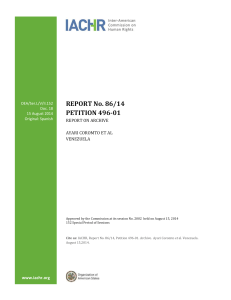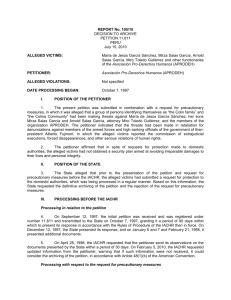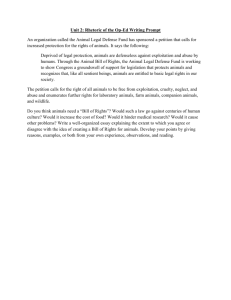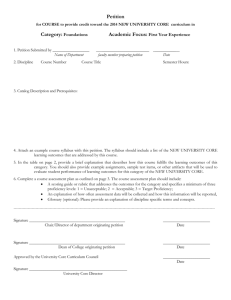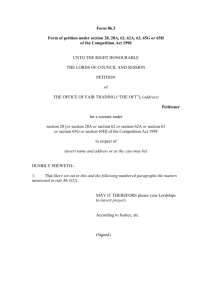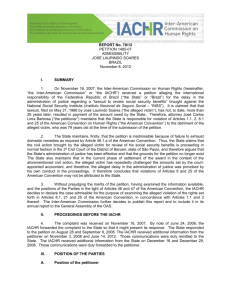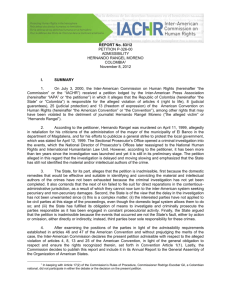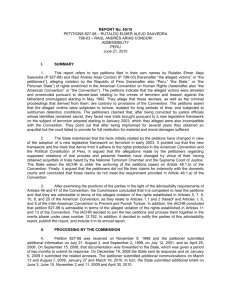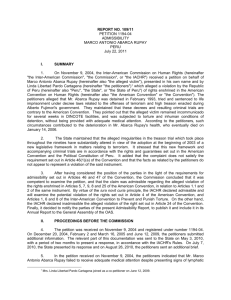Report No. 112/11 - Organization of American States
advertisement
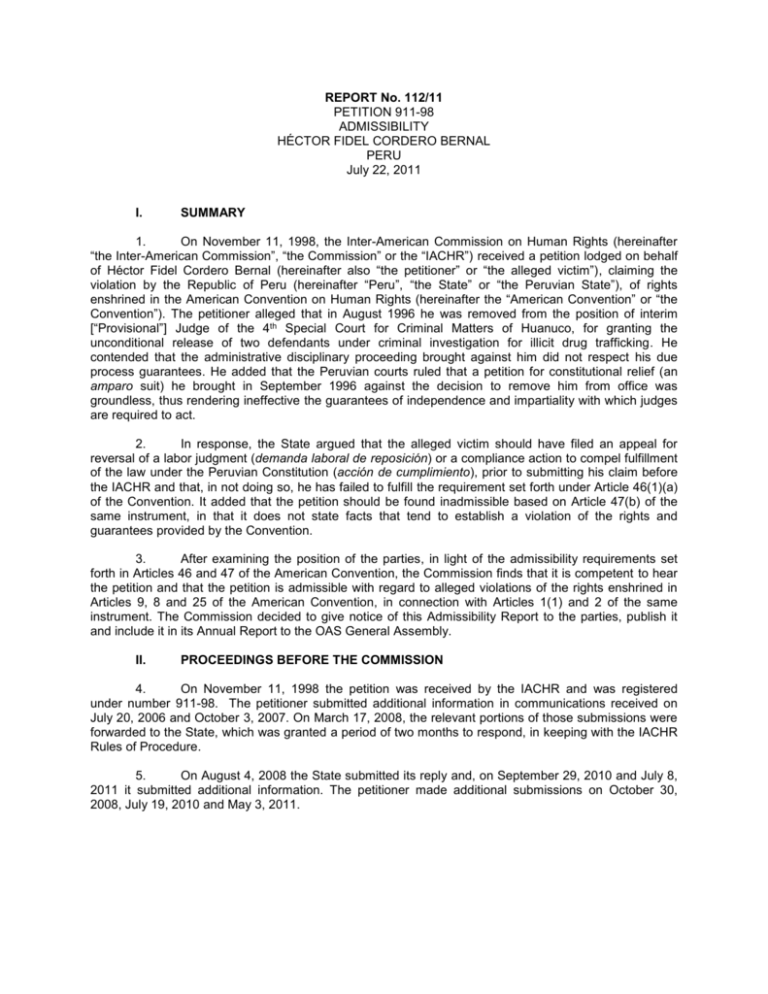
REPORT No. 112/11 PETITION 911-98 ADMISSIBILITY HÉCTOR FIDEL CORDERO BERNAL PERU July 22, 2011 I. SUMMARY 1. On November 11, 1998, the Inter-American Commission on Human Rights (hereinafter “the Inter-American Commission”, “the Commission” or the “IACHR”) received a petition lodged on behalf of Héctor Fidel Cordero Bernal (hereinafter also “the petitioner” or “the alleged victim”), claiming the violation by the Republic of Peru (hereinafter “Peru”, “the State” or “the Peruvian State”), of rights enshrined in the American Convention on Human Rights (hereinafter the “American Convention” or “the Convention”). The petitioner alleged that in August 1996 he was removed from the position of interim [“Provisional”] Judge of the 4th Special Court for Criminal Matters of Huanuco, for granting the unconditional release of two defendants under criminal investigation for illicit drug trafficking. He contended that the administrative disciplinary proceeding brought against him did not respect his due process guarantees. He added that the Peruvian courts ruled that a petition for constitutional relief (an amparo suit) he brought in September 1996 against the decision to remove him from office was groundless, thus rendering ineffective the guarantees of independence and impartiality with which judges are required to act. 2. In response, the State argued that the alleged victim should have filed an appeal for reversal of a labor judgment (demanda laboral de reposición) or a compliance action to compel fulfillment of the law under the Peruvian Constitution (acción de cumplimiento), prior to submitting his claim before the IACHR and that, in not doing so, he has failed to fulfill the requirement set forth under Article 46(1)(a) of the Convention. It added that the petition should be found inadmissible based on Article 47(b) of the same instrument, in that it does not state facts that tend to establish a violation of the rights and guarantees provided by the Convention. 3. After examining the position of the parties, in light of the admissibility requirements set forth in Articles 46 and 47 of the American Convention, the Commission finds that it is competent to hear the petition and that the petition is admissible with regard to alleged violations of the rights enshrined in Articles 9, 8 and 25 of the American Convention, in connection with Articles 1(1) and 2 of the same instrument. The Commission decided to give notice of this Admissibility Report to the parties, publish it and include it in its Annual Report to the OAS General Assembly. II. PROCEEDINGS BEFORE THE COMMISSION 4. On November 11, 1998 the petition was received by the IACHR and was registered under number 911-98. The petitioner submitted additional information in communications received on July 20, 2006 and October 3, 2007. On March 17, 2008, the relevant portions of those submissions were forwarded to the State, which was granted a period of two months to respond, in keeping with the IACHR Rules of Procedure. 5. On August 4, 2008 the State submitted its reply and, on September 29, 2010 and July 8, 2011 it submitted additional information. The petitioner made additional submissions on October 30, 2008, July 19, 2010 and May 3, 2011. 2 III. POSITION OF THE PARTIES A. Position of the Petitioner 6. The petitioner stated that he became a member of the Judiciary as an interim judge [“provisional judge”] on November 9, 1993, and was initially assigned to the Special Court for Civil Matters of the City of Tingo Maria, Department of Huanuco. He noted that on December 14, 1994 he took office as Interim Judge of the 4th Special Court for Criminal Matters of the City of Huanuco, of the Department of Huanuco. He stated that in the course of a criminal case for drug trafficking, he granted unconditional release on July 11, 1995, to two Colombian citizens, because he found that the requirements set forth in Article 201 of the Criminal Code of Procedure had been fulfilled.1 7. The petitioner claimed that, as a result of the above-cited decision, on August 11, 1995, the Judicial Oversight Office (OCMA) ordered him to cease duties and requested the Executive Council of the Judiciary to institute a disciplinary proceeding for his removal from office. He noted that said proceeding culminated in decision No. 008-96-PCNM of August 14, 1996, whereby the National Council of the Judiciary (hereinafter “the CNM” as in its Spanish acronym) ordered his dismissal. According to the submissions, the CNM found that in granting unconditional release to persons about whom the evidence cast sufficient indicia of criminal responsibility, Mr. Cordero Bernal “committed a serious act which, though not a CRIME, compromises the dignity of the office and is unworthy in the public view.” It was noted that said grounds for disciplinary action are provided for in Article 21.2 of Law 26.397 (Organic Law of the National Council of the Judiciary), which was further repealed and supplanted by Law 26.933 of March 12, 1998. 8. The petitioner emphasized that even though Article 21.2 of Law 26397 made it possible to dismiss a judge, who commits a serious act that compromises the dignity of the office, Article 210 of the Unified Amended Text of the Organic Law of the Judiciary, [which was] in effect during that time period, provided that “the serious act which, though not a crime and compromises the dignity of the office and is unworthy in the public view, is subject to the disciplinary measure of suspension from one to 60 days.” He added that Article 210 of the Organic Law of the Judiciary provides that the removal of a judge from office is only possible when there has been a prior disciplinary sanction, which according to his claim, did not occur in this case. He contended that because the decision against him stands in contradiction to this provision of the Organic Law, the CNM should have imposed the more lenient disciplinary measure on him. 9. The petitioner argued that Resolution No. 008-96-PCNM disputes the criteria applied by him as a judge, which was based on criminal procedural legislation. He claimed that said questioning by the CNM violates the principles of judicial independence and impartiality, as well as Article 212 of the Uniform Amended Text of the Organic Law of the Judiciary, which establishes that “a difference of opinion and of criteria in deciding cases does not give rise to sanction.” 10. As to the requirement of prior exhaustion of domestic remedies, Mr. Cordero Bernal contended that on September 6, 1996 he filed an amparo suit requesting that Decision No. 088-96-PCNM be vacated. He noted that on November 27, 1996, the amparo petition was found inadmissible by the Special Court of Public Law for Lima, and that said ruling was upheld in a judgment of the Transitory 1 Said provision sets forth the following: If at any stage of the proceedings it is fully proven that the defendant is not guilty, the Judge is required to order either sua sponte or at the request of the defendant, his unconditional release and the order shall be executed immediately and the respective case file should be submitted to the Correctional Tribunal when other defendants must remain in custody. When the case is only against the person who is the subject of the release, the main file shall be submitted. In this instance, when the Tribunal upholds the decision, the [judge being] consulted shall order the case to be dismissed. Should it strike down the decision, an order shall be issued to re-arrest the wrongly released person and any punishments may be imposed or actions taken that may be appropriate, should the release have been improper. 3 Corporative Chamber Specialized in Public Law of the Superior Court of Justice of Lima on September 24, 1997. He added that on May 8 1997 the Constitutional Court found his amparo claim groundless. Based on the submissions, said judgment was served on Mr. Cordero Bernal on July 31, 1998. 11. The petitioner stated that in addition to the disciplinary proceedings, he was charged for crimes against the administration of justice for aiding in the escape of criminal offenders (encubrimiento personal) and malfeasance in office (prevaricato). He noted that on June 21, 2005, he was acquitted by the Second Criminal Chamber of the Superior Court of Justice of Huanuco and that, on September 1, 2005, said decision was upheld on appeal. 12. Lastly, the petitioner alleged that the State is responsible for violation of the right to work and labor stability and claimed that Peru has the obligation to redress the damages caused by his arbitrary dismissal. B. Position of the State 13. The State’s account of the outcome of the disciplinary proceeding, the amparo petition, and the criminal proceeding for crimes against the administration of justice, is similar to that of the petitioner. It submitted copies of the principal rulings that were handed down over the course of each proceeding. It noted that the May 8, 1998 judgment of the Constitutional Court found that Decision No. 008-96-PCMN had been adopted in strict adherence to the law and in the context of a disciplinary proceeding in which the alleged victim could have freely exercised his right to a defense. 14. As to the admissibility requirements, the State argued that Mr. Cordero Bernal should have “filed a labor suit or a compliance action to compel fulfillment of the law under the Peruvian Constitution (acción de cumplimiento) prior to resorting to the Honorable Commission. These remedies provide expeditious proceedings for redressing the alleged violations of Mr. Cordero Bernal’s rights.” Accordingly, Peru argued that the petition should be found inadmissible, inasmuch as it does not fulfill the requirement set forth in Article 46(1)(a) of the Convention. 15. Copies of documentary evidence submitted by the State show that, on July 30, 1997, the Executive Commission of the Public Prosecutors Office received a criminal complaint lodged by the Head of the Judicial Oversight Office (OCMA) against Héctor Fidel Cordero Bernal for the crimes of malfeasance in office (prevaricato) and aiding in the absconding of criminal offenders (encubrimiento personal). That information indicates that on May 26, 1998, the First Criminal Chamber of the Superior Court of Justice of Huanuco instituted criminal proceedings. Following several convictions that were subsequently overturned in the court of appeals, on June 21, 2005, the 2nd Criminal Chamber of the Superior Court of Justice of Huanuco “[acquitted] defendant Héctor Fidel Cordero Bernal of the charges leveled against him for crimes against the administration of justice in aiding in the absconding of criminal offenders and malfeasance in office.” According to the submissions, said decision was upheld in the highest appellate court on September 1, 2005. 16. Lastly, the State claimed that the factual account set forth in the petition does not tend to establish a violation of the rights protected in the Convention and requested the IACHR to find the complaint inadmissible based on Article 47(b) of the above-cited instrument. IV. ANALYSIS OF ADMISSIBILITY A. Competence Competence of the Commission ratione personae, ratione loci, ratione temporis and ratione materiae 17. Under Article 44 of the Convention the petitioner is entitled to file a complaint. The alleged victim is an individual who was under the jurisdiction of the Peruvian State at the time of the 4 events in question. Furthermore, Peru ratified the American Convention on July 28, 1978. Consequently, the Commission is competent ratione personae to examine the petition. 18. The Commission is competent ratione loci to examine the petition, inasmuch as violations of rights protected by the American Convention are alleged therein which would have taken place within the territory of a State Party to said treaty. 19. Additionally, the Commission is competent ratione temporis to the extent that the obligation to respect and ensure the rights protected by the American Convention was binding upon the State on the date when the acts in the petition are alleged to have taken place. 20. Lastly, the Commission is competent ratione materiae because, as shall be explained hereunder, acts that could constitute violations of the rights protected by the American Convention are alleged in the petition. B. Exhaustion of Domestic Remedies 21. Article 46(1)(a) of the American Convention provides that for a petition filed with the Commission to be admissible in keeping with Article 44 of the Convention, it is necessary for domestic remedies to be pursued and exhausted in accordance with generally recognized principles of international law. The purpose of this requirement is to make it possible for national authorities to hear cases on alleged violations of a protected right and, when appropriate, have the opportunity to resolve them before they are heard by an international body. 22. The instant petition alleges the violation of rights protected in the Convention stemming from the decision of the CNM to dismiss Mr. Héctor Fidel Cordero Bernal from his office of Interim Judge of the 4th Specialized Court for Criminal Matters of Huanuco. The petitioner and alleged victim noted that on September 6, 1996, he brought an action for constitutional relief (amparo), moving for Decision No 008-96-PCNM, which ordered his dismissal as a judge, to be set aside. The submissions indicate that on May 8, 1998 that action was found to be groundless at the highest appellate level of the Constitutional Court. The State filed an objection on the grounds of non-exhaustion of domestic remedies, claiming that prior to the filing of the claim with the IACHR, the alleged victim should have filed a reinstatement labor suit (demanda laboral de reposición) or a compliance action to compel fulfillment of the law (acción de cumplimiento). 23. In keeping with the IACHR Rules of Procedure and the legal precedent of the InterAmerican system, whenever a State alleges non-exhaustion of domestic remedies, it bears the burden of indicating what remedies should have been pursued and prove that they are “adequate” to remedy the alleged violation; in other words, that the function of those remedies within the national legal system is suitable to redress the alleged violations of human rights brought to the attention of the Inter-American system. 24. Even though the Peruvian State mentioned that the alleged victim should have filed a reinstatement labor suit or a compliance action, it did not discuss the suitability of the amparo proceeding for the acts alleged in the petition to be remedied by the bodies of the domestic court system prior to being heard by this international body. Additionally, the IACHR notes that in the May 8, 1998 judgment, the Constitutional Court of Peru found the amparo suit brought by the alleged victim to be admissible, but that no violation of constitutional guarantees had been proven. This indicates that the supreme body of constitutional law in Peru did not refute the suitability of the amparo proceeding, but rather ruled on the merits of the controversy brought between Mr. Héctor Fidel Cordero and the respondent.2 2 The information appearing in the case file of the petition indicates that on September 24, 1997 the Special Chamber for Public Law of the Superior Court of Lima had found the amparo claim inadmissible. In its judgment on the appeal for constitutional relief dated May 8, 1998, the Constitutional Court overturned said decision of inadmissibility and “amending it found the amparo action to be GROUNDLESS.” See response submitted by the Peruvian State on August 4, 2008, annexes, judgment of the Constitutional Court, Case File No. 1051-97-AA/TC, single operative paragraph. The italics and bold and uppercase letters match the original text. 5 25. Based on the above-mentioned considerations, the IACHR overrules the preliminary objection made by the Peruvian State and finds that domestic remedies were exhausted by Mr. Héctor Fidel Cordero through the Constitutional Court judgment of May 8, 1998. C. Deadline for Submission of the Petition 26. Article 46(1)(b) of the Convention provides that in order for a petition to be found admissible, it must have been lodged within a period of six months from the date on which the interested party was notified of the final judgment that exhausted domestic remedies. 27. Based on the finding in paragraph 25 above, domestic remedies were exhausted by means of the Constitutional Court judgment on May 8, 1998. The parties’ submissions indicate that that judgment was served upon the alleged victim on July 31, 1998. Given that the instant petition was received by the IACHR on November 11, 1998, it fulfills the admissibility requirement set forth in Article 46(1)(b) of the Convention. D. Duplication of international proceedings and res judicata 28. Article 46(1)(c) of the Convention provides that for a petition to be admissible, the subject must “not be pending in another international proceeding for settlement” and, in article 47(d) of the Convention, it is stipulated that the Commission shall not admit the petition if it is substantially the same as one previously studied by the Commission or by another international organization. In the instant case, the parties have not raised the existence of any of those two circumstances of inadmissibility, nor can either one be inferred from the record in the case file. E. Characterization of the alleged facts 29. For the purposes of admissibility, the Commission must decide whether or not the petition states facts that could tend to establish a violation of rights as stipulated in Article 47(b) of the American Convention and whether or not the petition is “manifestly groundless” or “obviously out of order,” as provided in subparagraph c) of the same article. The rule governing evaluation of these particulars is different from the one required to decide on the merits of a complaint. The Commission must conduct a prima facie evaluation to examine whether the complaint substantiates the apparent or potential violation of a right guaranteed by the Convention and not to establish the existence of a violation. This review is a summary analysis that does not involve any prejudgment nor is it a preview of the opinion on the merits of the case. 30. The IACHR finds that, should it be proven that Mr. Héctor Fidel Cordero was dismissed as a result of decisions made by him in the course of the performance of his duties as a judge, that the alleged imposition of an inaccurate and harsher disciplinary sanction than the one that was in force at the time of the alleged acts is true, that Decision No. 088-96PCNM is indeed incompatible with the guarantee of judicial independence as alleged, and that there was no effective judicial response by the bodies that heard the amparo claim lodged on September 6, 1996, as claimed, this could tend to establish a violation of the rights enshrined in Articles 9, 8 and 25 of the American Convention, in connection with the general obligations set forth in Articles 1.1 and 2 of the same instrument. 31. The IACHR clarifies that the petitioner did not allege the violation of specific provisions of the Convention and, therefore, the articles listed in the previous paragraph were incorporated by virtue of the principle of jura novit curia. 32. Lastly, the Commission finds that the requirements provided under articles 47(b) and c) of the American Convention have been met, inasmuch as it is not evident that the claims brought by the petitioner are groundless and out of order. V. CONCLUSIONS 6 33. Based on the considerations of fact and of law set forth herein, and without prejudice to the merits of the matter, the Inter-American Commission finds that the instant case meets the requirements of admissibility set forth in Articles 46 and 47 of the American Convention and, consequently, THE INTER-AMERICAN COMMISSION ON HUMAN RIGHTS, DECIDES: 1. To find the petition under consideration admissible, with regard to the rights enshrined in Articles 9, 8 and 25 of the American Convention, in connection with the obligations set forth in Articles 1.1 and 2 of the same instrument. 2. Notify the State and the petitioners of this decision. 3. Proceed to examine the merits of the matter. 4. Publish this decision and include it in the Annual Report to be submitted at the OAS General Assembly. Done and signed in the city of Washington, D.C., on the 22nd day of July 2011. (Signed): Dinah Shelton, President; José de Jesús Orozco Henríquez, First Vice-President; Paulo Sérgio Pinheiro, Felipe González, and María Silvia Guillén, Commission Members.
